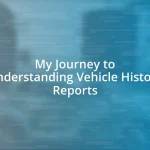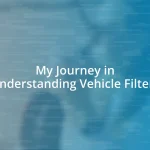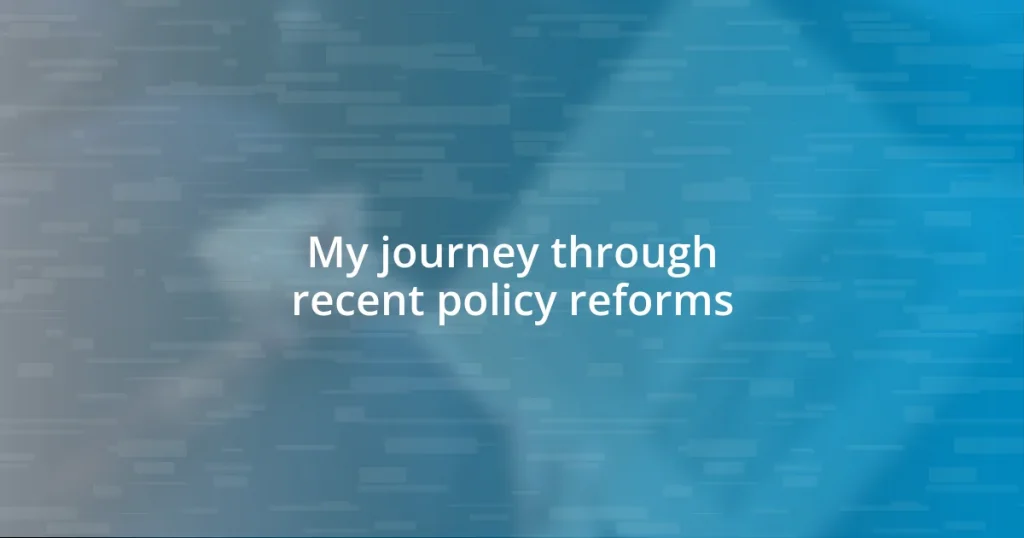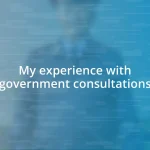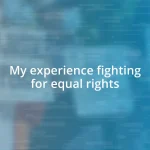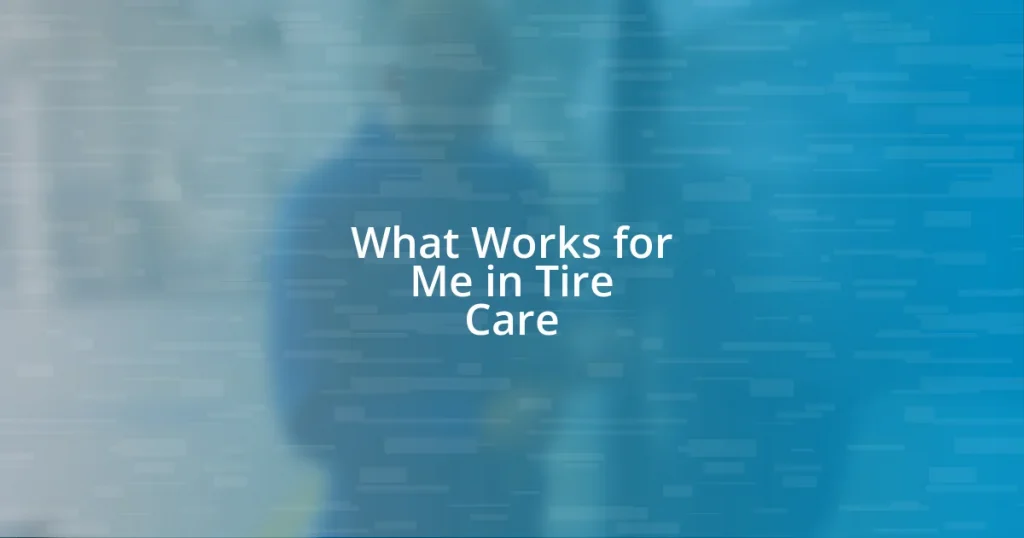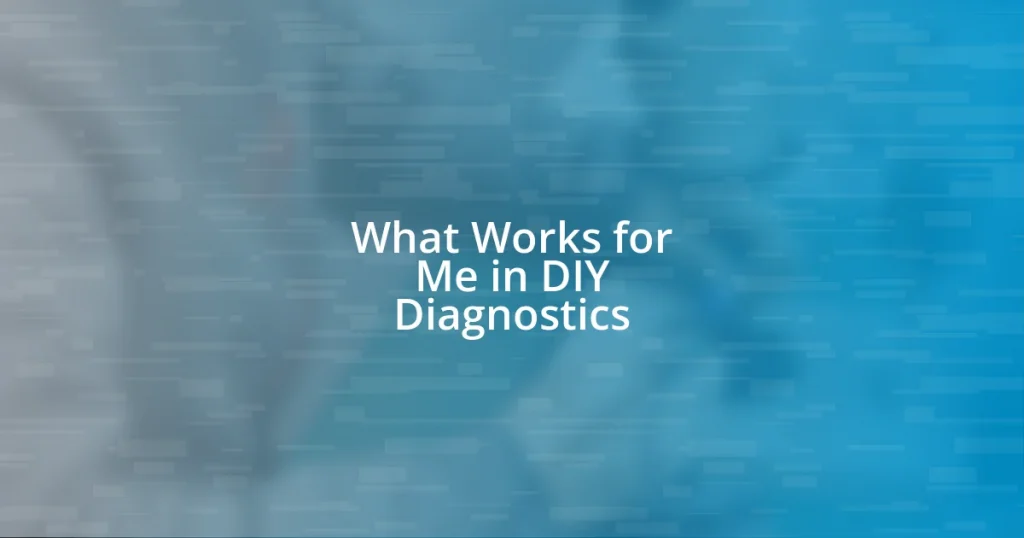Key takeaways:
- Recent policy reforms reflect a deep-rooted desire for progress, impacting areas like environmental regulations, education accessibility, and healthcare policies.
- Engagement in policy reform is driven by empathy, a sense of ownership, and the need for clarity, emphasizing the importance of community involvement and understanding diverse perspectives.
- Future policy engagement should leverage technology for dynamic participation and prioritize emotional intelligence among policymakers to foster genuine connections with the community.
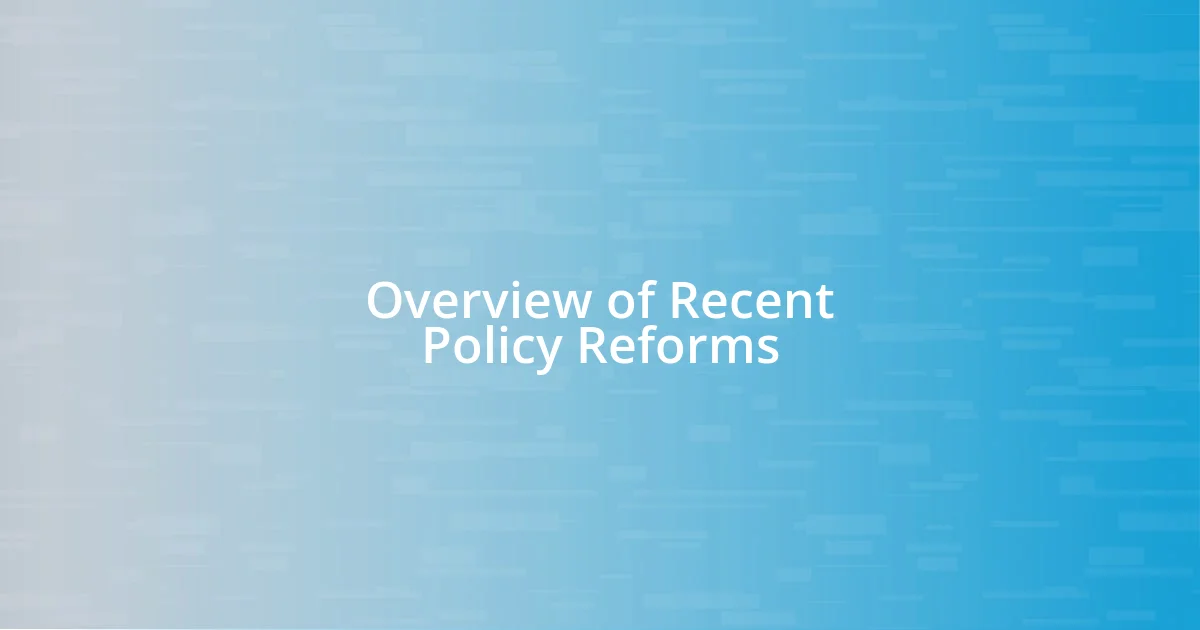
Overview of Recent Policy Reforms
Recent policy reforms have emerged as pivotal changes aimed at addressing pressing societal issues. From my vantage point, these reforms are not just bureaucratic updates; they reflect a deep-rooted desire for progress and accountability. For instance, when I first encountered the new environmental regulations, I felt a surge of hope—could this really be a turning point in our fight against climate change?
I’ve personally watched as education policies shifted to prioritize accessibility, impacting the community in profound ways. It made me wonder: How many lives might transform with these changes? Knowing that more students could now access quality education rekindled my optimism for future generations. It’s invigorating to see that these reforms are often fueled by the voices of those who have long felt unheard.
Additionally, as I dive deeper into the economic reforms, I often reflect on the real-world implications they hold. The adjustments made to taxation and welfare policies aren’t mere numbers on a page; they represent real families and their struggles. Are we truly enhancing opportunities for all, or are we merely shifting the burden? These challenging questions push me to stay engaged, reminding me that behind each policy change lies a story waiting to be written.
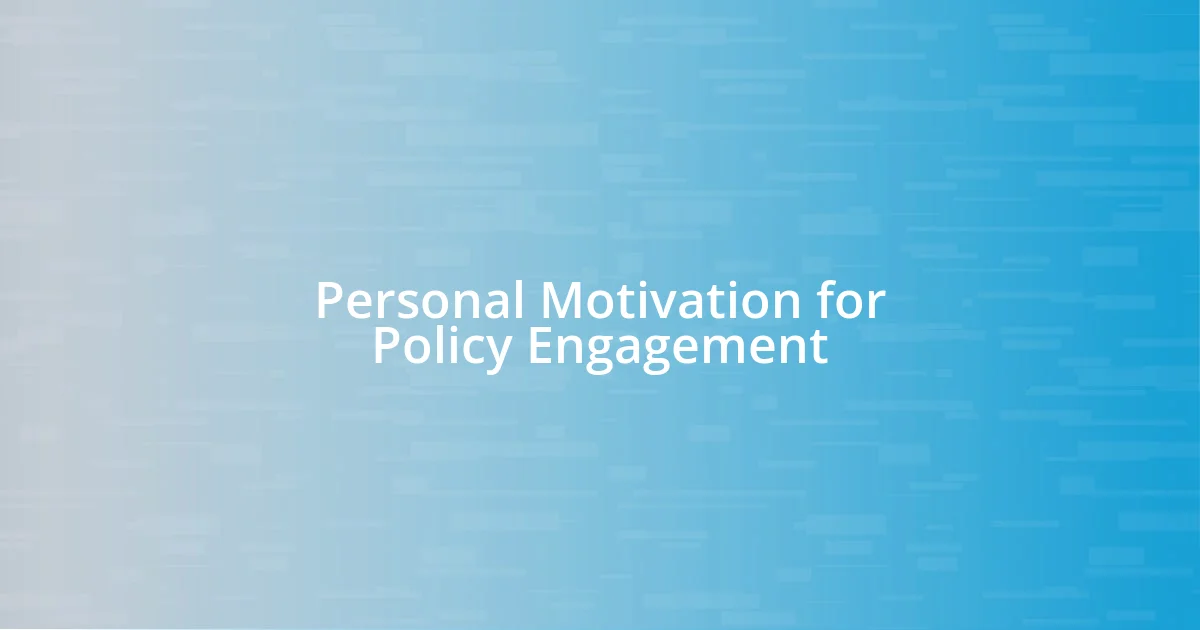
Personal Motivation for Policy Engagement
Engaging with policy reforms is, for me, a deeply personal journey. My motivation stems from a desire to be a voice for those who often feel marginalized by the system. A few years ago, I participated in a community meeting regarding housing policies. Hearing stories from families who struggled to find stable homes struck a chord within me. It made me realize that these reforms are not just theoretical; they impact lives daily.
Here are some key motivators that drive my involvement in policy reform:
- Empathy for Others: Understanding the unique struggles individuals face fosters a strong personal commitment to advocate for impactful change.
- A Sense of Ownership: Recognizing that I can contribute to positively shaping my community inspires me to engage actively in discussions and initiatives.
- Desire for Transparency: Witnessing how convoluted policy language often obscures meaning makes me passionate about pushing for clarity and accessibility in policy communications.
- Passion for Sustainable Solutions: My interest in long-term impacts drives me to advocate for policies that not only address current issues but also benefit future generations.
- Building a Network of Change-makers: Collaborating with others passionate about reform cultivates a sense of belonging and shared purpose, which motivates continued engagement.
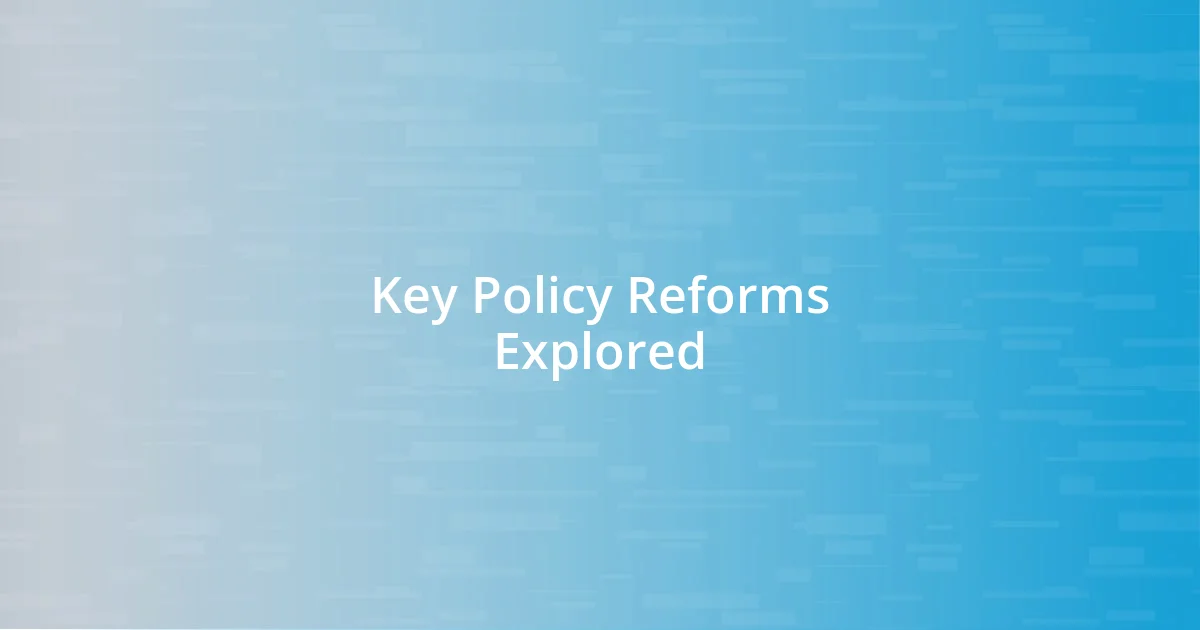
Key Policy Reforms Explored
Understanding the recent key policy reforms has been quite enlightening for me. For example, I recall attending a town hall meeting where the new health care policies were discussed. Listening to firsthand accounts from individuals who struggled with access was a powerful reminder of how vital these changes are. It’s not just about legislation; it’s about people’s lives.
The education reform, particularly the introduction of universal free lunch programs, has struck a personal chord. I remember volunteering in a local school where some students would occasionally come in hungry. With this reform, I see a tangible difference—it’s heartwarming to witness children now focusing better in class, without the distraction of an empty stomach. These policies breathe life into the mission of fostering future leaders who can learn and grow without barriers.
On the economic front, recent changes to minimum wage legislation have sparked intense debates, and I’ve found myself weighing both sides carefully. I often reflect on conversations I’ve had with local business owners who worry about increased labor costs. Yet, there’s also the undeniable need for workers to earn a living wage. It’s a delicate balance, and engaging with both perspectives has deepened my understanding of the intricate interplay that shapes our policy landscape.
| Policy Reform | Impact |
|---|---|
| Environmental Regulations | Encourages sustainable practices, combating climate change. |
| Education Accessibility | Improves opportunities for underprivileged students, fostering equality. |
| Healthcare Policies | Enhances access to health services, impacting community well-being. |
| Minimum Wage Legislation | Addresses income inequality while considering business sustainability. |
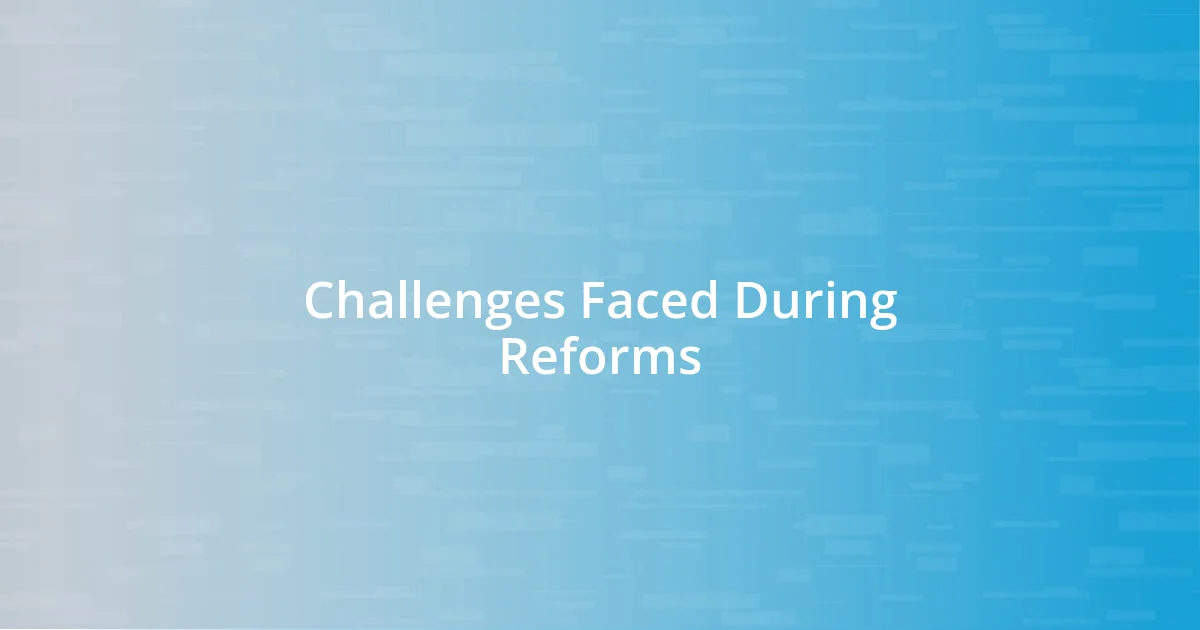
Challenges Faced During Reforms
Navigating the complexities of policy reforms hasn’t been without its hurdles. I recall a particularly heated discussion at a local forum about education accessibility. Some attendees were adamant about the necessity of changes, while others clung tightly to the status quo. I found myself torn—how do we balance the urgent need for reform with fears of losing what some consider a tried-and-true system? It’s moments like these that highlight the emotional stakes involved and remind me that reform isn’t just about policy; it’s a deeply personal matter for many.
Another challenge is the lack of resources to effectively support these initiatives. I vividly remember working on a community project aimed at promoting health care access. Despite our enthusiasm, we were met with significant funding shortfalls. This experience made me acutely aware of how crucial financial backing is to transform ideas into reality. It raises a pressing question: How can we advocate for meaningful change if the necessary resources to implement them are lacking? I felt a mixture of frustration and determination during that time, fueled by the voices of those we aimed to serve.
Lastly, communication barriers often stand in the way of progress. During a recent seminar, I witnessed the disconnection between policymakers and community members. Some individuals struggled to grasp the implications of the proposed reforms due to complex legal jargon. It struck me how critical it is to bridge this gap. If I, with my background, struggled to follow certain discussions, how could those with fewer resources expect to engage? This realization drives my passion for clear, accessible communication in the policy reform process, as it can empower everyone to take part in shaping their own future.
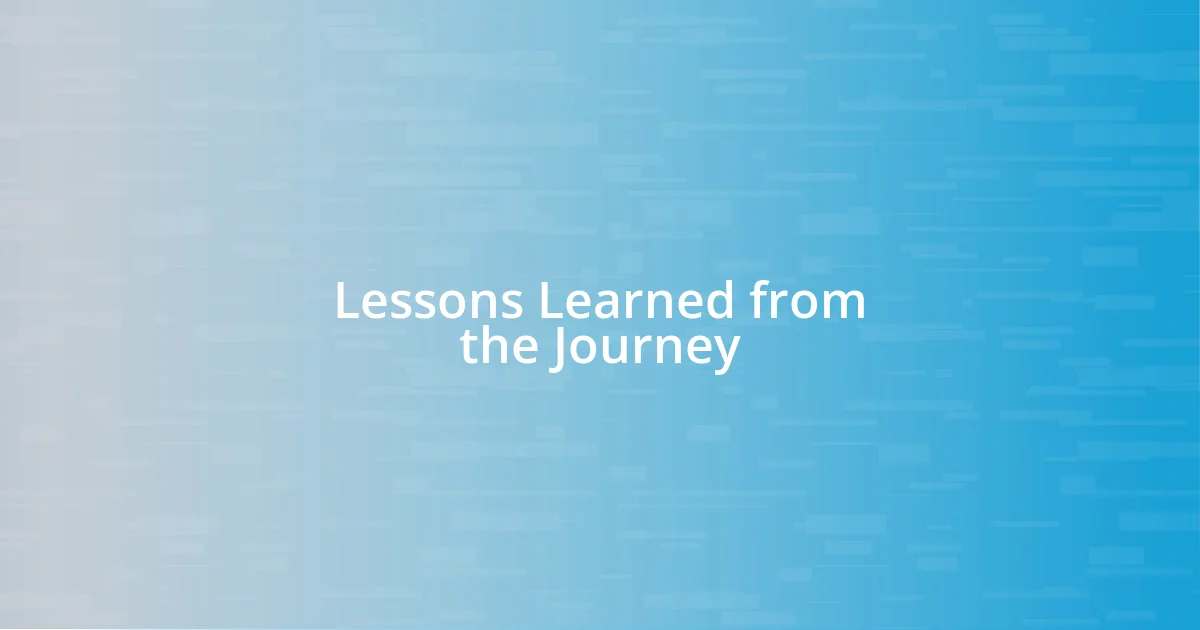
Lessons Learned from the Journey
Throughout my journey, one significant lesson I’ve learned is the importance of community engagement. I remember participating in a focus group where residents passionately shared their hopes and fears about the new environmental regulations. Hearing their stories made me realize that effective reform relies on understanding the community’s heartbeat. If we aren’t listening, how can we craft policies that truly resonate with those they affect?
Another crucial takeaway is the necessity for adaptability. I was involved in a project aimed at increasing healthcare access when unforeseen challenges emerged. We had to pivot our strategy multiple times to respond to community feedback and changing regulations. This experience taught me that flexibility is key in the face of uncertainty—if we cling too tightly to our original plans, we might miss opportunities for growth and improvement.
Finally, I’ve come to understand the power of education in facilitating meaningful change. During a workshop, I watched as individuals transformed their skepticism into enthusiasm when given clear information about policy impacts. It hit me then: Knowledge is empowering. How can we create a more informed citizenry if we don’t prioritize educational outreach? I’ve witnessed firsthand that when people understand the policies that govern their lives, they’re more likely to engage and advocate for reforms that reflect their needs.
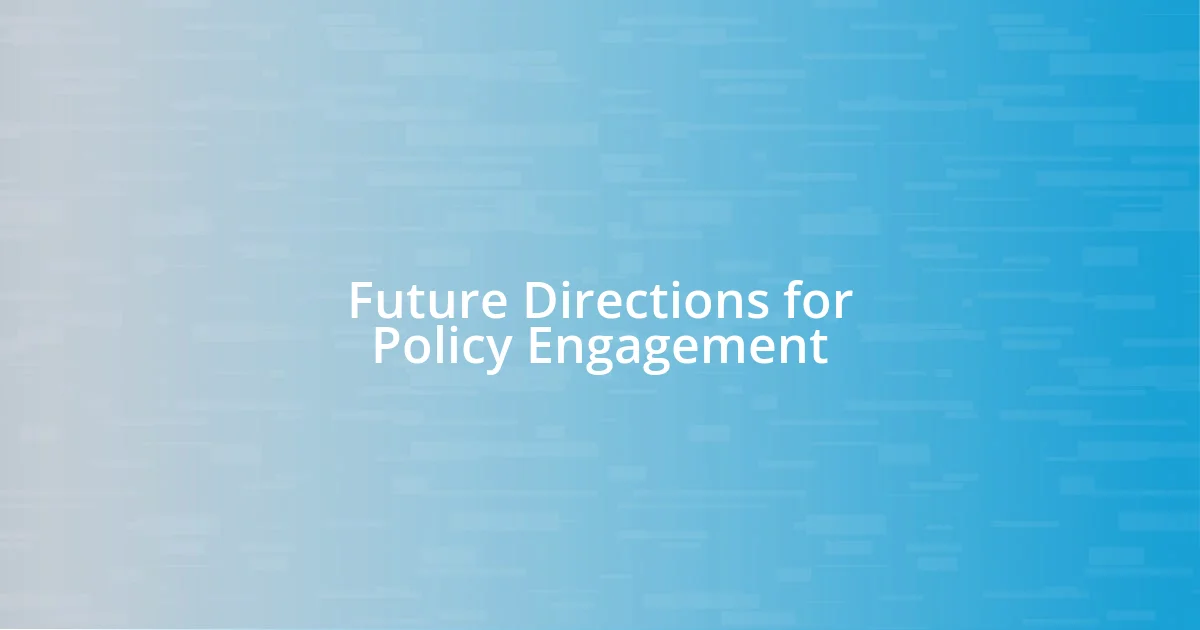
Future Directions for Policy Engagement
When I think about future directions for policy engagement, I can’t help but feel a sense of urgency. For instance, I once attended a town hall meeting where community members brought their own stories to the table, discussing how policy changes affected their daily lives. I realized then that creating platforms for such narratives could invigorate engagement and foster a sense of ownership among citizens—after all, isn’t it vital for everyone to see their experiences reflected in the policies that shape their communities?
The intersection of technology and policy is another exciting frontier. I recently experimented with a digital feedback tool for a local initiative, allowing residents to voice their thoughts in real-time. The input was overwhelming and reflective of a diverse range of opinions. It got me thinking: How can we harness technology not just to collect feedback, but to create more dynamic, participatory policymaking? I believe that integrating technology will enhance transparency and trust, ensuring that people feel heard and valued.
Moreover, the emotional intelligence of policymakers cannot be overlooked. I distinctly remember a policymaker genuinely connecting with constituents during a particularly challenging time in our community. The approachable demeanor and understanding shown made people feel safe to express their concerns. This experience taught me that empathy should be at the core of policy discussions. Isn’t it time we prioritize emotional connection in our engagement strategies to truly resonate with those we aim to serve?







